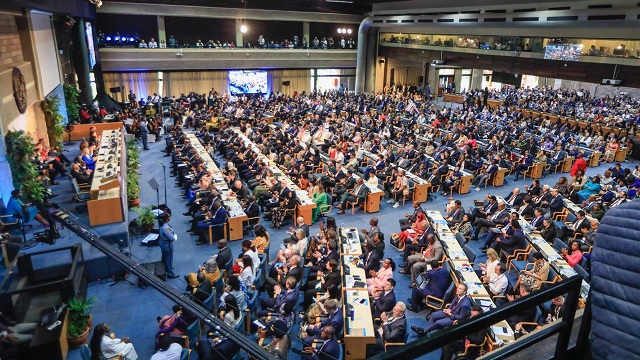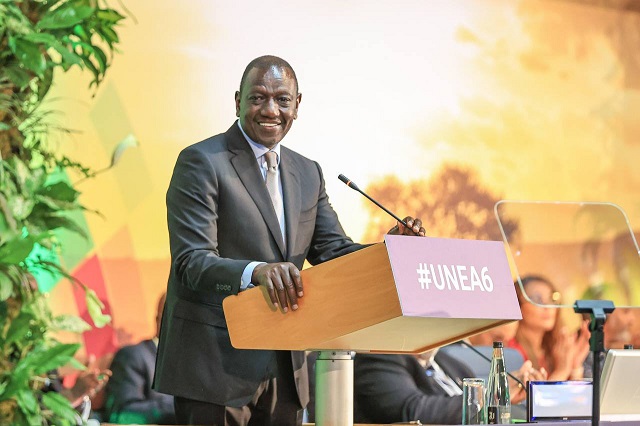
Nairobi, Kenya | THE INDEPENDENT | The sixth session of the United Nations Environment Assembly (UNEA-6) has opened in Nairobi Kenya to discuss a global treaty to ban plastics around the world.
UNEA is the world’s top decision-making body on the environment. It aims to help restore harmony between humanity and nature, improving the lives of the world’s most vulnerable people.
The assembly is being held at the United Nations Environment Programme (UNEP) headquarters in Nairobi, Kenya follows several assemblies aimed at a legally binding instrument on plastic pollution, including in the marine environment. Environment, health, and political leaders from around the world have so far been discussing the “reuse” part of the mantra “reduce, reuse, recycle.
They have highlighted the need to incorporate packaging reuse options into the negotiations on a new legally binding treaty on plastics.
Before the high-level session on Thursday, civil society groups, the scientific community, and the private sector discussed how multilateralism can help tackle the triple planetary crisis of climate change, nature and biodiversity loss, and pollution and waste.
Secretary-General of the United Nations, António Guterres in a video message to the Assembly called for urgent action to end plastics. He noted that such efforts are urgent because the planet is on the brink of collapse.
“The patient is in peril. And the patient is our planet. Band-aid solutions will not do. We need transformative action” he said
The WHO Director-General, Dr. Tedros Adhanom Ghebreyesus said UNEA-6 comes at a critical time for the health of our planet and the well-being of the human race. He decried the fact that humans have plundered our environment in the name of progress.
“The father of medicine hypocritic said when the physician treats, nature heals. We are now relearning what humans have known. But which since the Industrial Revolution, we have forgotten or ignored. We have forgotten that when we harm the environment, we harm ourselves. ” Ghebreyesus said.
He further noted that the World is now paying the price with a triple planetary crisis of climate change, biodiversity loss, and pollution. “If our planet were a patient, it would be admitted to intensive care. Its vital signs are alarming. It’s running a fever with each of the last nine months the hottest on record,” he said.
Dr. Tedros Adhanom Ghebreyesus used the occasion to rally the delegates to support the One Health Approach in bridging human, animal and Environmental Health.
The One Health approach focuses on interactions among people, animals, plants, and the environment, recognizing the interdependence of human, animal, and ecosystem health.
It should be noted that most emerging infectious diseases (60%) are zoonotic, 71% of which originate from wildlife
The United Nations Environment Assembly on 2 March 2022 adopted a resolution to end plastic pollution: towards an international legally binding instrument.
The Assembly noted with concern that the high and rapidly increasing levels of plastic pollution represent a serious environmental problem at a global scale, negatively impacting the environmental, social, and economic dimensions of sustainable development.
Experts have found that the rapidly increasing levels of plastic pollution represent a serious global environmental issue that negatively impacts the environmental, social, economic and health dimensions of sustainable development.
Studies have found that under a business-as-usual scenario and in the absence of necessary interventions, the amount of plastic waste entering aquatic ecosystems could nearly triple from some 9–14 million tonnes per year in 2016 to a projected 23–37 million tons per year by 2040.

Speaking at the opening of the Assembly, the President of Kenya, William Samoei Ruto urged countries around the world to ensure that pollution is curbed.
“Science is unequivocal that human activities are the primary catalyst for this phenomenon. Consequently, as humankind, we are persisting and endangering our existence” Ruto said.
He said without action, pollution patterns will continue to veer in an alarming direction. “No economy, community, or nation can tackle this challenge single-handedly with any hope of success. All the work must begin at home with effective domestic measures. In 2017, Kenya passed a law banning single-use plastic bags — the kind that grocery stores and other vendors give out to hold your purchases.
Around the World, we produce around 430 million tonnes of plastic a year, two-thirds of which are short-lived plastics, which soon become waste. Inger Andersen, executive director of the UN Environment Programme said
“None of us live on an island. We live on planet Earth, and we are all connected,” “The only way we can solve some of these problems is by talking together.” She has noted that a UN Treaty on plastic pollution would be the “most significant environmental decision since Paris.” The plan is to adopt the global plastics treaty in mid-2025
********
URN



